'While We Watched is like Titanic, but it's not about Jack and Rose.'
'It's about the musicians who decided to stay back and continue playing the violin when the ship went down.'
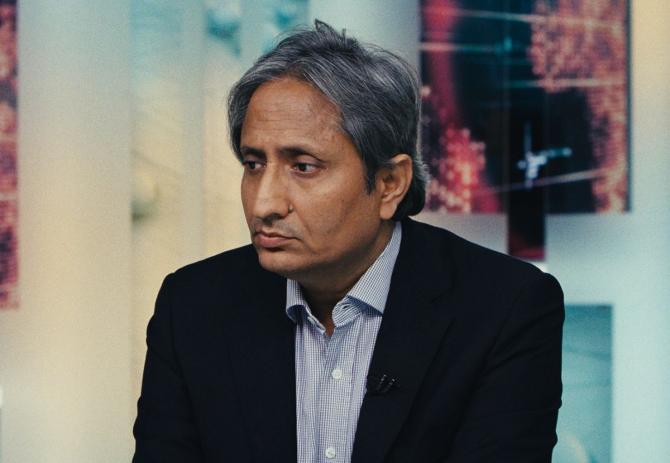
Six years ago, Vinay Shukla came to the Toronto International Film Festival for the world premiere of his documentary, An Insignificant Man.
The film on grassroot Indian politics focused on the emergence of the Aam Aadmi Party. Shukla was accompanied by his co-director Khushboo Ranka.
Last month Shukla was back at TIFF with his second feature -- While We Watched, a gripping exploration of the life and times of NDTV India's prime time anchor Ravish Kumar.
A brilliant film While We Watched at times works like a political thriller, much like Laura Poitras' Oscar-winning 2014 documentary Citizenfour.
Ravish Kumar is a popular news anchor and has a large social media presence, but in Shukla's film (Ranka was one of the film's producers), we see a lonely man grappling with his personal doubts as he is hounded by trolls, faces death threats and sharp competition with loud news anchors from other networks that align closely with the current government in India.
It is a tough scenario, but in the midst of it all Ravish Kumar comes across as a thoughtful and sincere person, who struggles every day to maintain his independent brand of news reporting.
When he is called an anti-national by an angry person on the phone, Ravish Kumar responds by singing Sare Jahan Se Accha, Hindustan Hamara.
While We Watched impressed audiences, critics and jury members at TIFF. The film was awarded one of the three Amplify Voices Awards at the festival.
On Thursday, October 13, 2022, it won the Cinephile Award at the Busan International Film Festival.
Rediff.com Senior Contributor Aseem Chhabra spoke to Vinay Shukla in Toronto about the making of While We Watched.
Vinay, you started working on the film four years ago. Did you know Ravish when you approached him?
I knew him briefly. I approached him cold.
I read a news report that NDTV was facing financial issues and they had made their landlord a stakeholder in the network.
Then I learned they weren't getting so much ad support.
I had grown up watching NDTV. And I didn't know this was happening.

But you were aware of what was happening in India four years ago?
Not too much about the news.
I tend to zone out, other than when I was working on An Insignificant Man, which was a political film.
I was just focusing on the Aam Aadmi Party and trying to take that documentary around.
You have to understand this was an act of self-preservation. You tend to zoom in on what can save you.
You tend not to give a piece of you to things that will not take care of you.
Now I have done four years of news watching.
A lot of people in India have stopped watching the news.
Clearly, the news is doing something to us that we don't want it to do.
There are many people who carry a certain kind of loneliness in their hearts.
They don't watch the news. They try to save themselves.
I wanted to make a film about that loneliness.
Every person who goes against the mainstream feels that loneliness.
You begin to question if the world around you has a place for someone like you.
This film starts with Ravish at the same place, wondering what he should be doing.
The question he asks right at the beginning of the film 'Jab aap akelapan mehsoos karte ho to kiski awaz sunte ho?'
Which is a question that I ask myself in my quietest moments.
Once I had heroes, and I would fall back on the words of my childhood heroes, my favorite film-makers.
I would try and go through their lives and learn from them. I am at a stage where I don't have many heroes now.

How old are you by the way?
I am 36.
You are very young to be dejected.
I am not dejected. Otherwise, I wouldn't have made this film. But I find no qualms in admitting the challenges our idealism faces every day. But I will forever be an idealist.
I came to cinema because I thought stories can help change the world.
Has my idealism been challenged? Yes. Does it remain? Yes. Woh nahin jayega mere liye.
When you approached Ravish, did you think he would open up, that you would catch him at vulnerable moments?
It takes a lot of time to build confidence. But most people are open to thoughtful critique.
If you spend time with them if you tell them 'Listen, I am going to hear you out, but I am also going to talk to people who criticise you.'
If people think that you will see the side of them, that is human, that they are trying to make better. They will let you in.
I spent a lot of time in the NDTV newsroom, with Ravish, and his family. Nobody opens up on the first day.
Nobody pulls you into their most intimate meetings on the first day.
NDTV is a news organisation. Everybody knows the power of the camera. It takes time to build confidence.
I shot for a year-and-a-half. I rented a place close to his house.
I shot about eight hours a day. I would shoot 45 minutes of him driving every day.
I would leave home at noon, and get to his house. We would meet him in the parking lot.
We would rig up the car, shoot his drive, and get to the office. The camera would follow him to his office.
Then we would set up within his office and cover his entire day. We would wait for the evening broadcast at 9 pm.
Then the last 10 minutes while he was doing the broadcast, we would go down, and get our rigs back in the car.
He would collect his stuff, go into his car, we would continue to shoot with him to his door.
Sometimes we would go inside his house. We would eventually reach home by 11 pm. It was about 11 hours of active shooting every day.
And you had no idea how the story was evolving?
We didn't know where the story was going. But I knew I was telling the story of an extremely lonely journalist.
Main unke akelepan ki kahani bata raha tha. I was trying to capture his confusion, broodiness, his inner conflict.
You obviously didn't know that he was going to win the Magsaysay Award.
Of course, no one had any idea about that.

Does he feel more lonely than the other NDTV anchors? He's their only Hindi anchor, but there are others like Nidhi Razdan and Sreenivasan Jain.
I don't know Sreenivasan and Nidhi.
I wouldn't be able to tell how they feel or how Ravish feels vis a vis both of them. But the truth is that we, the English speaking, tend to fuss more about the English speaking.
That is something that the English speaking need to think about.
Did you discuss the loneliness with him? Was it being caused by doubt, whether it was worth what he was doing, if it really achieved anything?
I think that loneliness comes across in his broadcast. A lot of people talk about, 'Oh, he's very angry.'
'Why is he so concerned?' 'Why is he saying this or that?' In terms of what's causing it, I was looking at it from the lens of cinema.
Offscreen baat cheet kar ke kuch fayeda nahin hai, kyoki phir aapko lagta hai ki wohi capture karna padega.
So you never interviewed him on the screen?
That's not my style. I don't do interviews.
We are a very big cinema-consuming culture. But if I ask somebody from my family to watch a documentary, they will say hum nahin dekhenge.
One of the reasons is that documentaries do not speak in the language that people understand.
I make films for my parents, about things I find difficult to have conversations around with my friends.
So I make sure that the film I make speaks in a language they understand and about things they are concerned about.
That's why I don't use views, although that's a classical documentary structure.
It must have been tough observing him on a daily basis and seeing his stress. Poor man, his staff was leaving him often.
I am sure you have been in a position like that too, right? When people around you are quitting or you see layoffs.
Yes, I have seen that in corporate America. But I am much quieter. I don't have it in me to challenge systems. But the death threats Ravish gets and the hate messages. I am just amazed at his ability to sustain and to keep going on.
Yeah, but even as a film journalist, you must have received a lot of flak and hostile reactions.
Yes, almost always when I give a bad review to a Salman Khan film for instance. I have faced horrible trolling and abuses on social media.
I am saying this is the story of the lonely crusade. It can happen across disciplines.
It's not so much about one kind of journalist.
It's the story of startup entrepreneurs whose startups suddenly stop doing well. And you begin to wonder if you are still relevant. It's very hard.
There's a beautiful title of a documentary on the making of a Werner Herzog film -- Burden of Dreams.
Every time you have a dream that India should be a certain kind of country, somebody has to carry the burden.
People have a dream their kids should have a better life.
Somebody has to pay the cost for the dream. This film is about the burden of those dreams.
I tell people this film is like Titanic, but it's not about Jack and Rose. It's about the musicians who decided to stay back and continue playing the violin when the ship went down.
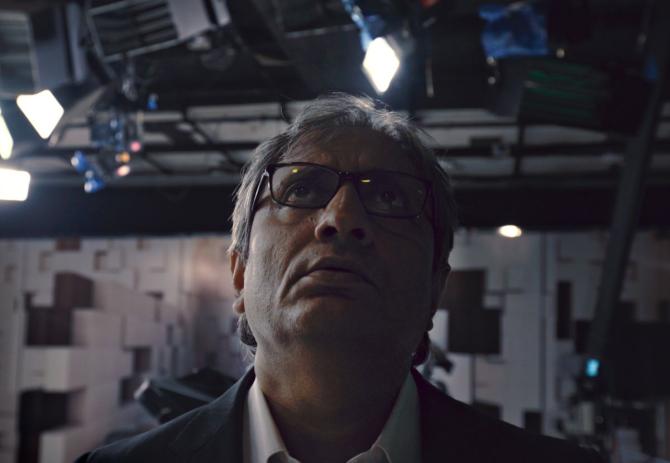
So what did you learn about Ravish?
He's far more whimsical and funny. It's unfortunate that the film doesn't capture that quite well. We would laugh the whole day.
His humour keeps him going.
Yeah, absolutely. He's very funny. And he has a huge network of friends. A lot of them were trolls who have become friends.
His phone rings constantly. He answers too many phone calls.
Every day he writes a 40-minute show. He also writes a 5,000-word essay on Facebook.
The other day. He wrote a long literary analysis in Hindi about Enrique Iglesias's song Bailamos.
You have some lovely moments between him and his daughter. Obviously, he gets strength from her.
I am sure it's not an easy life for his wife when you see your husband getting death threats like that, but she is a solid force behind him.
Very often our families have to endure the cost of the decisions we make.
We may be heroes when we step out. But my parents, siblings and friends will tell you what my inner life is, what I need and how they need to take care of me.
Where were you four years ago when you started making the film and where are you now? I feel there is hope at the end of the film. The only way we can survive is to keep hope alive.
I am a classic old-school optimist. Four years ago, I had just finished co-directing my first film. And I fought so much to get it released.
Almost everybody along the way said don't make that film. We fought a battle with the censors.
People underestimate the impact of that, on your own ambitions and aspirations. But we came out stronger.
To be honest, at that point, I would wonder if I were a one film wonder.
I co-directed one film, but will I make another? I am at a better place today in terms of my film-making skill. I am very proud of that and of my team.
You said you fought a battle to get your first film released. How will you bring this film to India?
I was an optimist in the first film and I am also optimist with this film.
This film is about building better systems in India.
We are living in polemic times, when people disagree they do it very loudly. But I believe if we can talk to people, then we can walk together towards a better tomorrow.
We have to stop thinking about one news anchor, one news television, one political party, one leader, one government, because we have to start investing in better systems, that served you and me in getting to where we are in our lives.
I am not the first film-maker sitting in Toronto talking in English about making a documentary.
As the song goes Kal aur aayenge nagmo ki khilti kaliyan chunne walle, mujhse behtar kehne walle, tumse behtar sunne walle.
There's a system here in Toronto that allows people to come, meet film-makers like me and for us to say our thing.
The same thing needs to happen in India. With film festivals, with news organisations.
We need to have better systems that allow for more diverse voices, and opinions. And I am aspiring for that conversation and I hope that I will find the right partners.
Feature Presentation: Rajesh Alva/Rediff.com


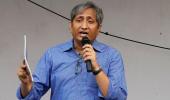

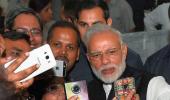



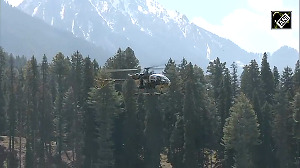
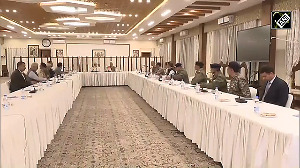
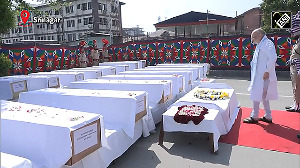
 © 2025
© 2025